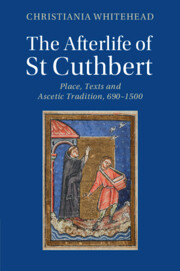Book contents
- The Afterlife of St Cuthbert
- Cambridge Studies in Medieval Literature
- The Afterlife of St Cuthbert
- Copyright page
- Contents
- Abbreviations
- Acknowledgements
- Introduction
- Chapter 1 Blessings on Pregnant Seals: Constructing Cuthbert’s Asceticism in His Anonymous and Bedan vitae, and the Historia ecclesiastica, 690–740
- Chapter 2 Travels with My Coffin: The Dislocation and Defence of the Community of St Cuthbert in the Historia de Sancto Cuthberto, 793–1050
- Chapter 3 The Bishop in the Rain: Celebrating the New Order in Symeon of Durham’s Libellus de exordio, Old English Durham and the Capitula de miraculis et translationibus sancti Cuthberti, 1066–1140
- Chapter 4 Expansions and Contractions of Saintly Space in Two Cuthbertine Miracle Collections: Reginald of Durham’s Libellus de admirandis, and De mirabilibus, 1150–1210
- Chapter 5 Godric of Finchale, Bartholomew of Farne and the ‘Irish’ Libellus de ortu Sancti Cuthberti: Three Eremitic Responses to St Cuthbert, 1150–1210
- Chapter 6 Delimiting Sanctity in Two Meditations from Farne Island: The Exortacio ad contemplacionem and the Meditaciones of the Monk of Farne, 1210–1370
- Chapter 7 Vernacular Epitomes and Encyclopedias: Southern Legendaries and the Metrical Life of St Cuthbert, 1270–1500
- Conclusion
- Notes
- Bibliography
- Index
- Cambridge Studies in Medieval Literature
Chapter 3 - The Bishop in the Rain: Celebrating the New Order in Symeon of Durham’s Libellus de exordio, Old English Durham and the Capitula de miraculis et translationibus sancti Cuthberti, 1066–1140
Published online by Cambridge University Press: 03 December 2020
- The Afterlife of St Cuthbert
- Cambridge Studies in Medieval Literature
- The Afterlife of St Cuthbert
- Copyright page
- Contents
- Abbreviations
- Acknowledgements
- Introduction
- Chapter 1 Blessings on Pregnant Seals: Constructing Cuthbert’s Asceticism in His Anonymous and Bedan vitae, and the Historia ecclesiastica, 690–740
- Chapter 2 Travels with My Coffin: The Dislocation and Defence of the Community of St Cuthbert in the Historia de Sancto Cuthberto, 793–1050
- Chapter 3 The Bishop in the Rain: Celebrating the New Order in Symeon of Durham’s Libellus de exordio, Old English Durham and the Capitula de miraculis et translationibus sancti Cuthberti, 1066–1140
- Chapter 4 Expansions and Contractions of Saintly Space in Two Cuthbertine Miracle Collections: Reginald of Durham’s Libellus de admirandis, and De mirabilibus, 1150–1210
- Chapter 5 Godric of Finchale, Bartholomew of Farne and the ‘Irish’ Libellus de ortu Sancti Cuthberti: Three Eremitic Responses to St Cuthbert, 1150–1210
- Chapter 6 Delimiting Sanctity in Two Meditations from Farne Island: The Exortacio ad contemplacionem and the Meditaciones of the Monk of Farne, 1210–1370
- Chapter 7 Vernacular Epitomes and Encyclopedias: Southern Legendaries and the Metrical Life of St Cuthbert, 1270–1500
- Conclusion
- Notes
- Bibliography
- Index
- Cambridge Studies in Medieval Literature
Summary
This chapter examines three early twelfth-century texts produced at Durham: an ecclesiastical history, a short vernacular poem and a Cuthbertine miracle collection, that propose a new phase in the history of Cuthbert’s cult. These texts applaud the restoration of monastic attendance at the shrine, and interpret Cuthbert’s ceremonial translation into the new cathedral as a replay of his late seventh-century translation on Lindisfarne. Bede’s sanctity is given a prominent role alongside Cuthbert’s as the textual driver behind northern church reform. These Cuthbertine texts emerge as sites of forceful criticism, both towards Anglo-Saxon and Norman secular elites who attempt to coerce the cult, and also, more surprisingly, towards some of the bishops of Durham. Cuthbert’s interest in defining and monitoring jurisdictional spaces is carried over from the Historia, but rendered with greater ambition. On the one hand, the saint devotes much of his power to promoting the diocese as his independent lordship, free from financial and judicial incursion; on the other, he uses retributive miracles to define a distinctively masculine monastic jurisdiction debarred to women.
Keywords
- Type
- Chapter
- Information
- The Afterlife of St CuthbertPlace, Texts and Ascetic Tradition, 690–1500, pp. 48 - 74Publisher: Cambridge University PressPrint publication year: 2020



